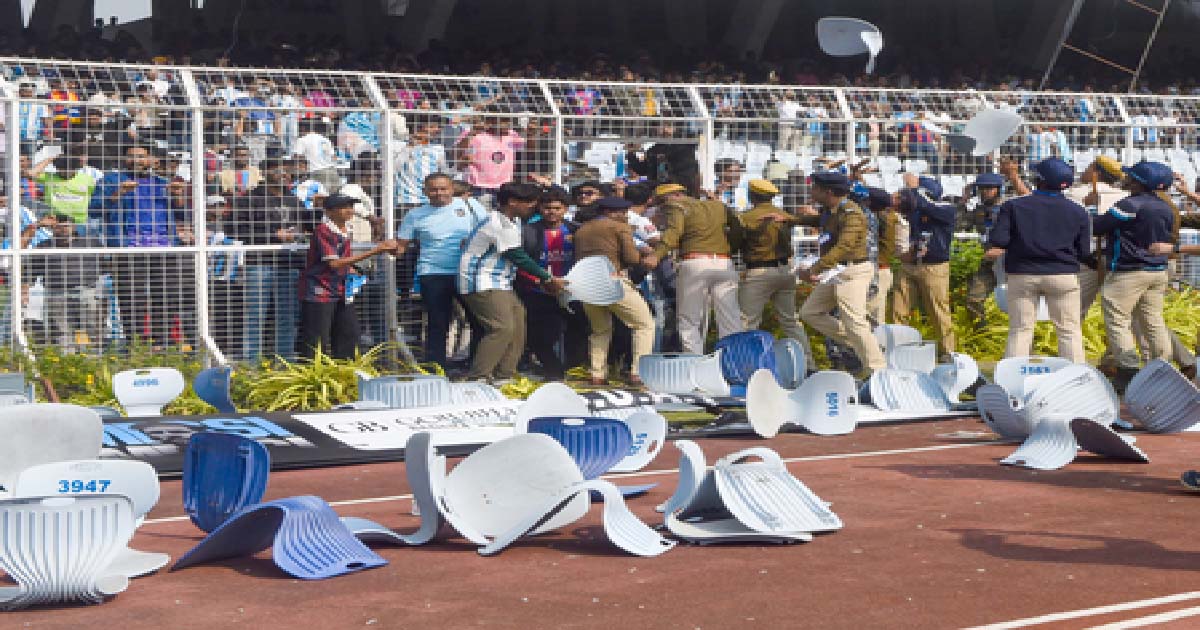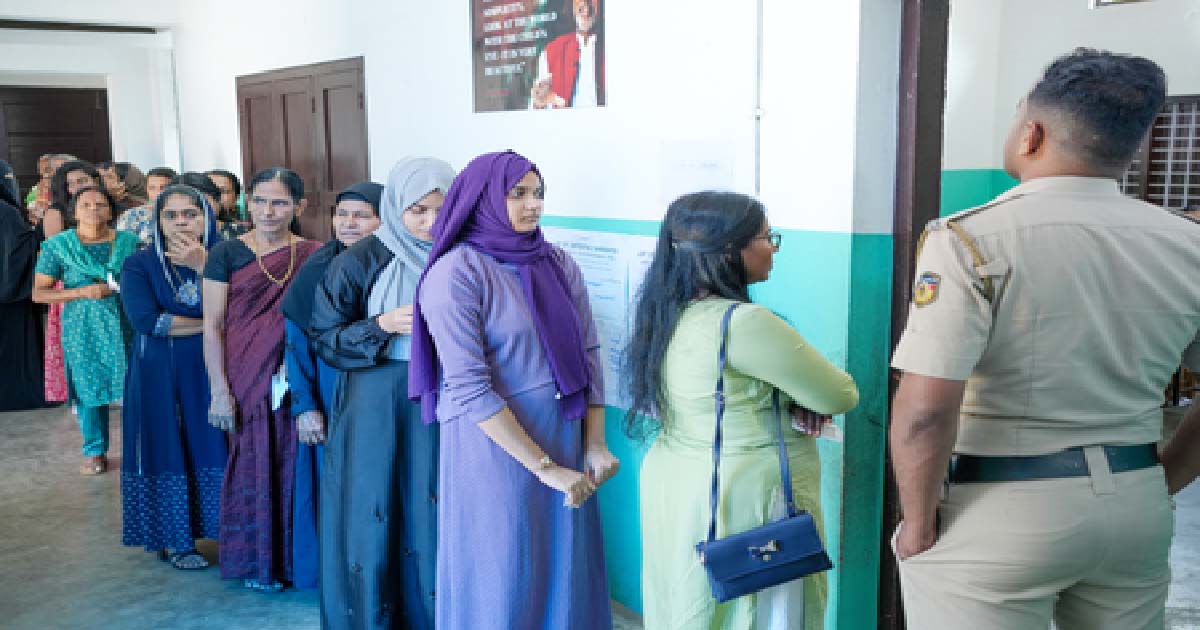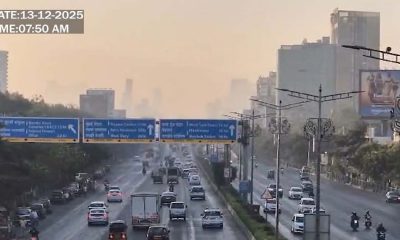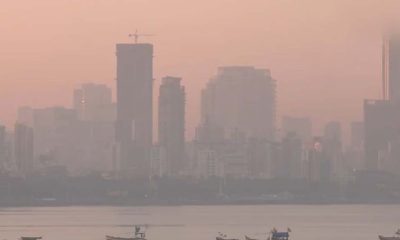National News
Mamata Banerjee hits out at Modi govt over IT survey at BBC offices: “There will be no media left in country”
Kolkata: “The Income Tax survey at the BBC’s offices in Delhi and Mumbai is very unfortunate,” said West Bengal Chief Minister Mamata Banerjee on Wednesday. She criticized the BJP government for conducting the survey and accused them of “running a political vendetta.” Banerjee also expressed concern that the freedom of the press has been affected by the action against the broadcaster and warned that soon there may be no media left in the country.
She added that the media is already under the control of the BJP and cannot raise their voice as their management will cut their service within 24 hours. Comparing the BJP to Hitler, Banerjee said that their only mandate is a dictatorship and they are worse than Hitler.
“I am abided by the mandate of the people. Where is their (BJP) mandate? They don’t care about the people’s mandate. BJP’s only mandate is a dictatorship, (they are) more than Hitler. My sympathy and my support with media and BBC,” she said.
She further alleged that BJP wants to capture the judiciary also adding that the judiciary must be neutral as only the judiciary can save this country.
“Sometimes they have said against the judiciary also and they want to capture the judiciary also. But we want judiciary must be neutral…only judiciary can save this country,” she added.
The income tax (I-T) department on Wednesday continued its survey at the offices of the BBC in Delhi and Mumbai for the second day, sources say.
On Tuesday, the I-T department conducted a survey at BBC’s offices in Delhi and Mumbai in view of the British public broadcaster’s “deliberate non-compliance” with the Transfer Pricing Rules and its vast diversion of profits. Yesterday, the sleuths arrived at the BBC offices located at the national capital’s KG Marg and Mumbai’s Kalina Santacruz for the survey.
In the case of the BBC, sources said there has been persistent non-compliance with the above-mentioned rules for years. As a result of the same, several notices have been issued to the BBC. However, the BBC has been continuously defiant and non-compliant and has significantly diverted its profits, sources said.
Sources said the above exercise, conducted by the tax authorities, is called “survey”, not search or raid as per the provisions of the Income Tax Act. Such surveys are routinely conducted and are not to be confused to be in the nature of a search/raid, said sources.
The key focus of these surveys is to look into the manipulation of prices for unauthorised benefits, including tax advantages. These surveys have been undertaken due to BBC’s persistent non-compliance of the norms, making it a repeat offender.
In this case, sources said BBC has been, “non-compliant under transfer pricing rules; persistent and deliberately violative of transfer pricing norms; and deliberately diverted a significant amount of the profits and have not followed the arm’s length arrangement in the case of allocation of profit.”
Accordingly, the surveys have been conducted with a view to investigating BBC’s violation of the Transfer Pricing Rules and its diversion of profits.
After the I-T department survey, sources in the United Kingdom government said they are monitoring the developments closely.
“We are closely monitoring reports of tax surveys conducted at the offices of the BBC in India,” UK government sources said.
Meanwhile, BBC has said it is cooperating with the income tax department, which is conducting a survey at its offices in New Delhi and Mumbai.
“The Income Tax Authorities are currently at the BBC offices in New Delhi and Mumbai and we are fully cooperating,” the BBC News Press Team said in a statement.
The development comes weeks after the BBC released a documentary on Prime Minister Narendra Modi – ‘India: The Modi Question,” which caused controversy.
The Centre had issued directions for blocking multiple YouTube videos and Twitter posts sharing links to the controversial BBC documentary on PM Modi.
The Supreme Court had on February 3 directed the central government to produce original records relating to its decision to block the BBC documentary.
National News
Mamata Banerjee announces judicial committee to probe chaos at Salt Lake Stadium over Lionel Messi’s visit

Kolkata, Dec 13: With chaos and vandalism breaking out at Salt Lake Stadium on the northern outskirts of Kolkata on Saturday over high ticket prices and limited access to Argentinian soccer star Lionel Messi during his visit to the stadium, West Bengal Chief Minister Mamata Banerjee announced setting up a judicial committee headed by a retired judge of the Calcutta High Court to probe the mismanagement that led to the chaos.
With the agitators resorting to a rampage within the stadium over limited access to Messi despite purchasing tickets at exorbitant prices, the police had to resort to a massive lathi charge and deploy Rapid Action Force (RAF), following which the Argentinian soccer star left the stadium early.
The Chief Minister was on her way to the stadium. However, on receiving the news of the ruckus at the stadium, she directed her driver to turn back the car. Soon after that, she issued a statement announcing her decision to set up a judicial committee headed by a retired judge of the Calcutta High Court to probe the mismanagement that led to the chaos.
“I am deeply disturbed and shocked by the mismanagement witnessed today at Salt Lake Stadium. I was on my way to the stadium to attend the event along with thousands of sports lovers and fans who had gathered to catch a glimpse of their favourite footballer, Lionel Messi. I sincerely apologise to Lionel Messi, as well as to all sports lovers and his fans, for the unfortunate incident,” the Chief Minister said in her social media statement.
Announcing the decision to form the judicial probe committee, she said that the committee will be headed by Justice (Retd) Ashim Kumar Ray. The state chief secretary, Manoj Pant, and the additional secretary to the state home and hill affairs department, Nandini Chakraborty, will be the two other members of the probe panel.
“The committee will conduct a detailed enquiry into the incident, fix responsibility, and recommend measures to prevent such occurrences in the future. Once again, I extend my heartfelt apologies to all sports lovers, the Chief Minister added.
National News
Lionel Messi GOAT India Tour: Traffic Diversions Announced In Mumbai On December 14 | Know Restrictions For Roads Around Wankhede Stadium

Mumbai: The Mumbai Police has announced traffic diversions as football fans in the city are set for a major attraction, with Argentina skipper and World Cup winner Lionel Messi scheduled to visit Mumbai on December 14. The global football icon will visit Wankhede Stadium, where the event is set to begin at 5 pm. With a large turnout expected, the police have put special traffic arrangements and diversions in place to manage crowd movement and ensure smooth traffic flow in and around the stadium area.
diversions will be effective on 14 December from 12:00 pm to 11:00 pm.
According to the report, commuters heading to Wankhede Stadium should note that no parking will be permitted inside the stadium premises. As per the report, parking restrictions will be there on C, D, E, F and G roads. In addition to this, along with these, there will also be restrictions on Veer Nariman, Dinshaw Vachha, Jamshethji Tata and N.S. Road.
To manage traffic flow, one-way movement will be implemented on D Road (west to east) and E Road (southbound). Entry and movement on Veer Nariman Road will also remain restricted during this period.
Several road closures have also been announced, including the Coastal Road stretch between Marine Drive and Worli/Tardeo, and Chandra Bose Road, according to the report.
For those arriving by car, parking facilities will be available on a limited basis near Churchgate, HT Parekh Marg, Dorabaji Tata Road, Jamanalal Bajaj Marg and Vidhan Bhavan.
Messi’s Mumbai visit will begin with his participation in a high-profile charitable fashion showcase, where memorabilia from Argentina’s historic 2022 World Cup win will be auctioned. The proceeds from the auction will be donated to charitable causes, adding a meaningful layer to the event.
As per media reports, Bollywood heavyweights such as John Abraham, Kareena Kapoor Khan, and Jackie Shroff are expected to join the showcase.
Sport will take centre stage again at the Cricket Club of India, which will host a special Padel Cup. The friendly yet competitive match is set to feature cricket icons, including Sachin Tendulkar, alongside celebrity guests. A separate 7v7 celebrity football match with Bollywood actors is also reportedly in the works, promising crowd-pleasing entertainment.
At Wankhede Stadium, fans will witness Messi in his element. The football icon will conduct an exclusive coaching clinic for 60 children, 30 boys and 30 girls, selected from emerging football talent pools. The stadium event also includes interactive penalty shootouts and a masterclass led by Messi himself, followed by a musical concert celebrating his legacy.
National News
‘Victory for democracy’: Congress candidate Vaishnav Suresh on Kerala local body poll win after legal battle

Thiruvananthapuram Dec 13: Congress candidate Vaishnav Suresh on Saturday described her victory in the Kerala local polls as “a triumph of democracy and truth”, days after her candidature, initially rejected by the authorities, was restored following the intervention of the Kerala High Court.
Suresh defeated sitting Thiruvananthapuram Corporation councillor Amshu Vamadevan, who shifted from his original seat to contest the Muttada seat but lost to the first-timer.
The Muttada seat, since its inception, was a citadel of the CPI-M.
Soon after the early results indicated her victory, Vaishnav said she was “very happy” and termed the outcome a clear message from the people.
“This is a victory for democracy. Truth will always triumph, and it has done so here. People knew what was happening,” she said, adding that she had “fought a good fight”.
Vaishnav’s candidature had attracted statewide attention after her nomination papers were rejected during scrutiny on technical grounds.
The decision triggered protests from the Congress, which alleged unfair treatment and claimed the rejection was politically motivated.
Vaishnav subsequently approached the High Court, which, after hearing her plea, ordered the authorities to accept her nomination, allowing her to re-enter the fray.
The legal battle, coupled with her young age, turned Vaishnav into a prominent face of the Congress campaign in the constituency.
Party leaders projected her case as an example of institutional injustice and rallied support around what they described as a fight to protect democratic rights.
Her campaign, which resumed after the court order, focused on governance issues as well as the larger theme of safeguarding democratic processes.
Political observers note that the verdict in her favour is significant not just for the Congress, but also in the broader context of the local body elections, where procedural disputes and legal challenges featured prominently in several places.
Vaishnav’s win is being seen as a morale booster for the Congress, particularly among youth and first-time candidates.
Congress leaders welcomed the result, stating that it reaffirmed public faith in both the judiciary and the electoral process.
They also credited voters for “seeing through attempts to deny a candidate her legitimate right to contest”.
For Vaishnav, the victory marks the beginning of her political journey under intense public scrutiny.
Reiterating her commitment to the electorate, she said she would work to justify the trust placed in her and focus on addressing local issues.
“This mandate belongs to the people who stood by me,” she said, signalling that the fight, though won at the ballot box, was only the first step in public life.
-

 Crime3 years ago
Crime3 years agoClass 10 student jumps to death in Jaipur
-

 Maharashtra1 year ago
Maharashtra1 year agoMumbai Local Train Update: Central Railway’s New Timetable Comes Into Effect; Check Full List Of Revised Timings & Stations
-

 Maharashtra1 year ago
Maharashtra1 year agoMumbai To Go Toll-Free Tonight! Maharashtra Govt Announces Complete Toll Waiver For Light Motor Vehicles At All 5 Entry Points Of City
-

 Maharashtra1 year ago
Maharashtra1 year agoFalse photo of Imtiaz Jaleel’s rally, exposing the fooling conspiracy
-

 National News1 year ago
National News1 year agoMinistry of Railways rolls out Special Drive 4.0 with focus on digitisation, cleanliness, inclusiveness and grievance redressal
-

 Maharashtra1 year ago
Maharashtra1 year agoMaharashtra Elections 2024: Mumbai Metro & BEST Services Extended Till Midnight On Voting Day
-

 National News1 year ago
National News1 year agoJ&K: 4 Jawans Killed, 28 Injured After Bus Carrying BSF Personnel For Poll Duty Falls Into Gorge In Budgam; Terrifying Visuals Surface
-

 Crime1 year ago
Crime1 year agoBaba Siddique Murder: Mumbai Police Unable To Get Lawrence Bishnoi Custody Due To Home Ministry Order, Says Report






















